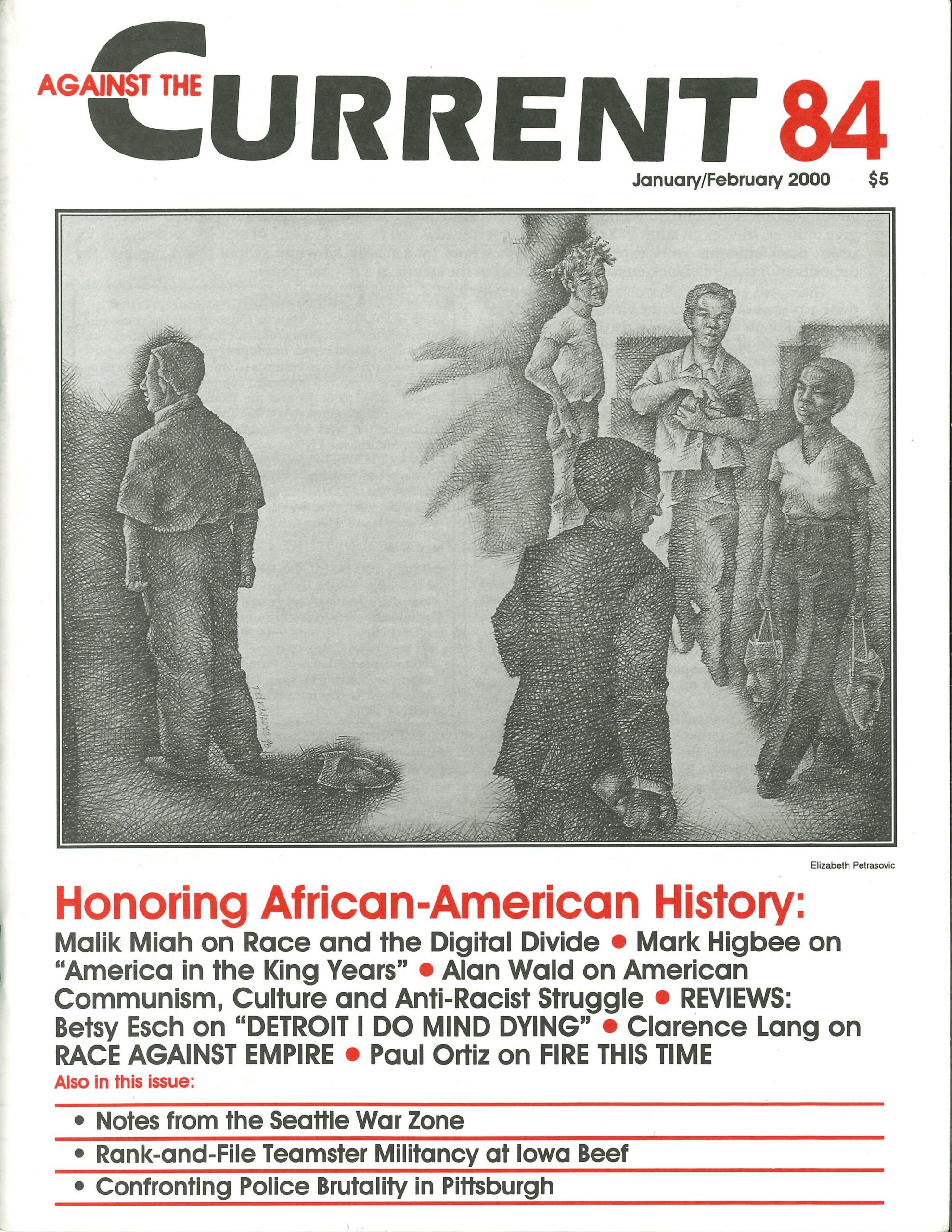Against the Current, No. 84, January/February 2000
-
A War on Black Children?
— The Editors -
Seattle: "What Democracy Looks Like"
— Susan Weissman interviews Dana Frank, Leone Hankey and Lisa Fithian -
The Rebel Girl: Feminism and the WTO
— Catherine Sameh -
Russia's Chechnya Syndrome
— Susan Weissman -
The War is a Double Terror: Stop the New Stage of the Chechen War!
— Scholars for Democracy and Socialism -
The Battle of Iowa Beef: IBP Teamsters Lose a Strike But Build a Union
— Henry Phillips -
Grassroots Power vs. Police Brutality
— An Interview with Claire Cohen - Honoring Black History
-
Racial Capitalism and the "Digital Divide"
— Malik Miah -
The King Years Chronicled
— Mark Higbee -
fires had seed in the flowers
— Kim Hunter -
Review: African Americans, Culture and Communism
— Alan Wald -
Review: Penny Von Eschen's Race Against Empire
— Clarence Lang -
Still Got the News
— Betsy Esch -
The Anatomy of A Rebellion
— Paul Ortiz - More Reviews
-
Travails of U.S. Labor
— Sheila Cohen -
Facing Fascism in Europe
— Bill Smaldone - Dialogue
-
Dialogue: "The War of Gods": Marxism and Christianity
— Michael Löwy and Terry Murphy - In Memoriam
-
Baruch Hirson, 1921-1999
— Paul Flewers
Catherine Sameh
WHAT’S FEMINISM GOT to do with it?
The well-organized and publicized political protests at the WTO meetings in November have inspired activists from a wide array of movements hungry for precisely the kind of multi-issue organizing and solidarity that blossomed in Seattle.
While much has been made of the labor and environmental bridging, little has been reported of any feminist presence at the protests. But if any issue is a feminist issue, it’s free trade.
Who, after all, comprises the work force in sweatshops around the world? And of the jobs being decimated at home, many have at least a fifty percent female workforce.
“I see this as an issue that hits women really hard,” says Madelyn Elder, president of Portland’s Communication Workers of America, Local 7901. “In a lot of Southeast Asian countries affected by free trade, many of the low wage workers are women, many who don’t have rights at home or in the streets.”
Nancy Haque, an organizer with Portland’s Jobs With Justice, echoes Elder. “The women in the sweatshops are often young women, many supporting families with these jobs.”
While women workers overseas face exploitative working conditions, women workers in the United States are seeing their jobs disappear. Says Elder, “In the needle trades, women are the majority of workers, and these jobs went overseas. I’m in a union that’s fifty percent women. Many of them do keyboarding.
“Companies whipsaw us all the time. With a flick of the switch, they can move to Dallas, Texas. I represent people in AT&T. The last AT&T in the Pacific Northwest with a union presence closes its ofice this January 18. Boom, it’s shut down, all that work shipped to Texas.
“That’s the way it’s going. What are the chances of these workers finding jobs with the same pay and benefits?”
I asked Elder if the particular concerns of women were addressed in the protests. “Certainly, there were some signs saying that the people hit the hardest are women. Most of the CWA folks there were women, and a lot of the organizers were women. But most of the speakers were men, because most of the national labor leaders are men. But the civil disobedience was organized mostly by women,” said Elder.
Haque, who spent five days in the King County Jail for civil disobedience, said there were many women in jail. “The women in jail were amazing. I was in jail with Starhawk the whole time, and she was just amazing.”
The WTO protests have clearly solidified and united social movements unlike any struggle in recent history. Women are participating at all levels of organizing: as workers, heads of families, and activists.
Women’s concerns will remain at the heart of ongoing anti-WTO organizing, as female-dominated jobs in the U.S. continue to disappear and women’s lives in sweatshops around the world are sold down the road.
Opportunities for feminist organizing—particularly international, multiracial and cross-class—will be rich as corporate “free trade” continues to unravel the lives of women around the world.
ATC 84, January-February 2000

